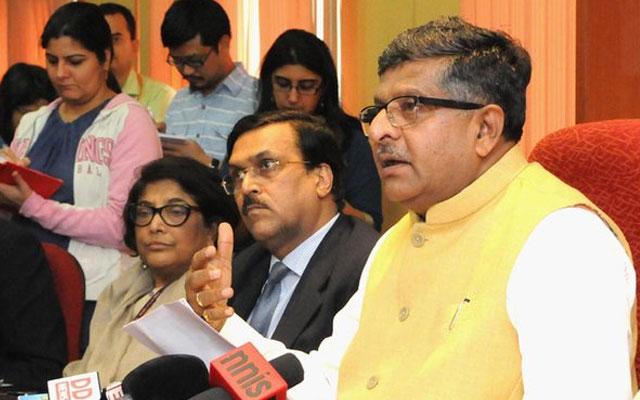A day after the National Democratic Alliance (NDA) government presented its Union budget for Bharat, union minister for communications and information technology (IT) Ravi Shankar Prasad said that the budget announcements will strengthen the country’s IT infrastructure.
Prasad’s interaction with reporters on Tuesday was aimed to communicate the budget’s narrative for development in the backdrop of nine states, including West Bengal, Punjab, Tamil Nadu and Uttar Pradesh, going for elections by 2017. While petroleum minister Dharmendra Pradhan addressed reporters on Monday on the budget proposals; power, coal and renewable energy minister Piyush Goyal will be meeting the press on Wednesday. The government is projecting a gross domestic product (GDP) growth of 7-7.75 per cent for the next fiscal.
“The budget proposals will give a big boost to the Digital India initiative, digital literacy, application of cloud and electronics manufacturing,” Prasad told reporters. The government has allocated Rs27,996 for communications and IT ministry in the current budget.
For the telecom sector, the budget brought clarity over taxability of third-party usage of spectrum and it will now attract service tax. With this announcement, such transactions will be outside the purview of the value-added tax (VAT).
Also, finance minister Arun Jaitley announced a duty advantage of 10.5% for domestic manufacturing of mobile phones, battery, wired headsets, speakers and components.
“Customs and excise duty structure plays an important role in incentivizing domestic value addition towards Make in India campaign of our government,” Jailtey said on Monday while delivering the budget speech and added, “…changes in customs and excise duty rates on certain inputs, raw materials, intermediaries and components, and certain other goods and simplify procedures, so as to reduce costs and improve competitiveness of domestic industry in sectors like Information technology…”
Drawing parallel from the duty rationalisation especially for electronics manufacturing announced in the Union budget of 2015, Prasad said that mobile units manufactured in the country has more than doubled to 110 million in FY16 compared with 54 million in FY15.
“Electronics manufacturing has seen a remarkable improvement due to several initiatives taken so far. We have received proposals worth Rs1.2 trillion till date. When our government came to power, in May 2014, proposals worth of only Rs11,800 crore were received,” Prasad said while adding that after duty rationalisation was announced last year, 16 new mobile manufacturing units have been set up in the country.
These include Chinese personal computer manufacturer Lenovo Group which in July last year started assembling smartphones in Chennai at a facility run by Singapore-based contract manufacturer Flextronics International Ltd. Last July Karbonn Mobile India Pvt. Ltd set up a plant in Noida, near New Delhi, in partnership with mobile phone designer, manufacturer and supplier Water World Technology Co. Also, smartphone brands Xiaomi Corp. and InFocus have partnered with Foxconn Technology Group to manufacture devices at the latter’s Andhra Pradesh facility. Foxconn has announced a $5 billion investment to set up manufacturing units in Maharashtra over the next five years.
“We need to derive greater benefit from our demographic advantage. We need to spread digital literacy in rural India. Of the 16.8 crore rural households as many as 12 crore households do not have computers and are unlikely to have digitally literate persons,” said Jaitley.
The Indian telecom industry welcomed the move.
“We are happy that the budget has walked the talk for Make in India by proposing changes in the customs and excise duty structure in components and sub-components to give fillip to the creation of domestic mobile component ecosystem,” said Keshav Bansal, director, Intex Technologies (India) Ltd.
Additionally, in a bid to promote electronic manufacturing, the current year’s budget has proposed a duty advantage of 8.5% for domestic manufacturers of routers, broadband modems, set-top boxes, digital video recorders, network video recorders, closed circuit television cameras and lithium ion batteries compared with such goods being imported.
“This will further encourage manufacturing of telecom equipment,” added Prasad.
Finance minister Arun Jaitley also allowed tax benefits for IT units in special economic zones (SEZs) till 2020. The benefit allowed under section 10AA of the Income-tax Act was earlier stipulated till 2017.This is expected to enable technology units to set up and commence operations in SEZs.
“The budget has a strong emphasis on leveraging technology to transform India. The initiatives announced combined with swift implementation of Digital India will help to digitize India and provide effective citizen services,” said R. Chandrashekhar, president, National Association of Software and Services Companies, an industry lobby group.
Note: This story has been republished with corrected data.






